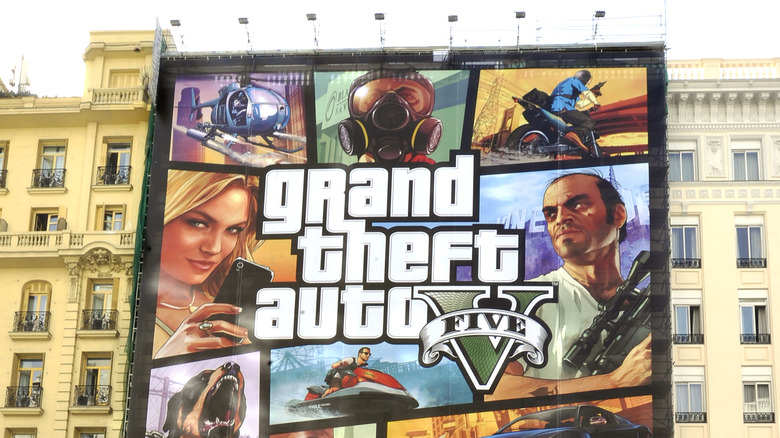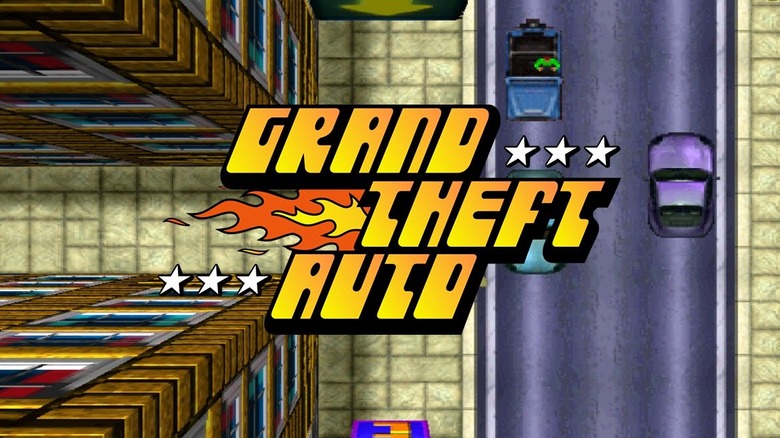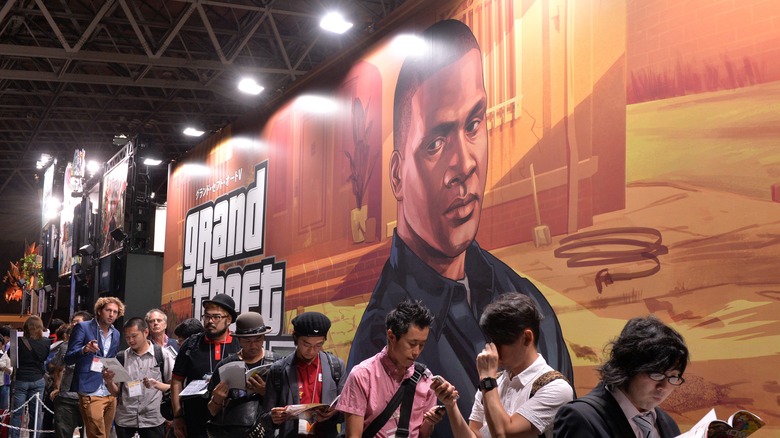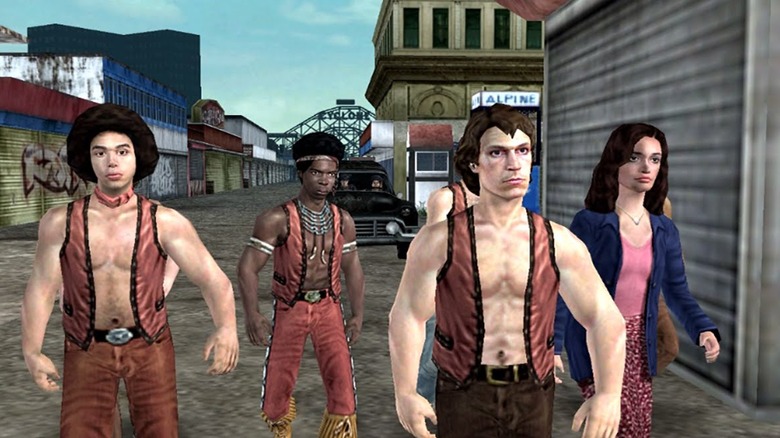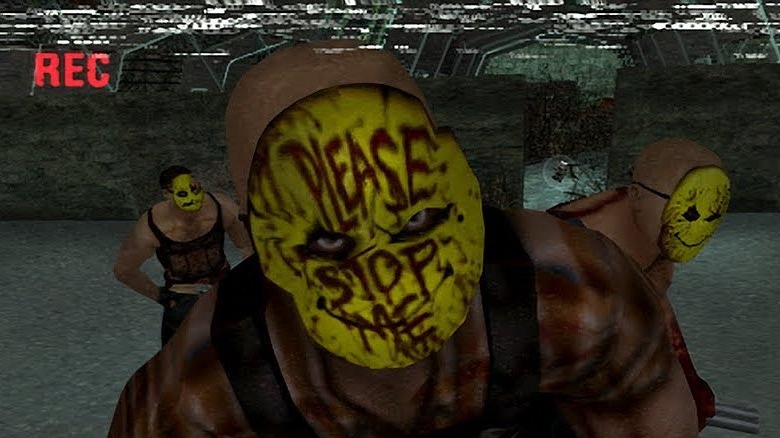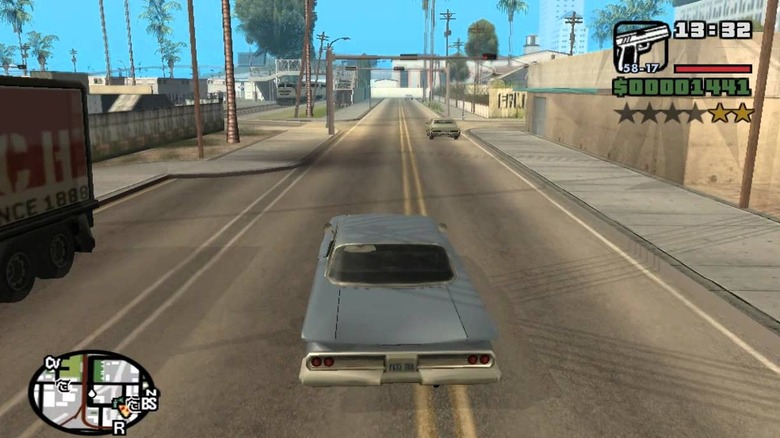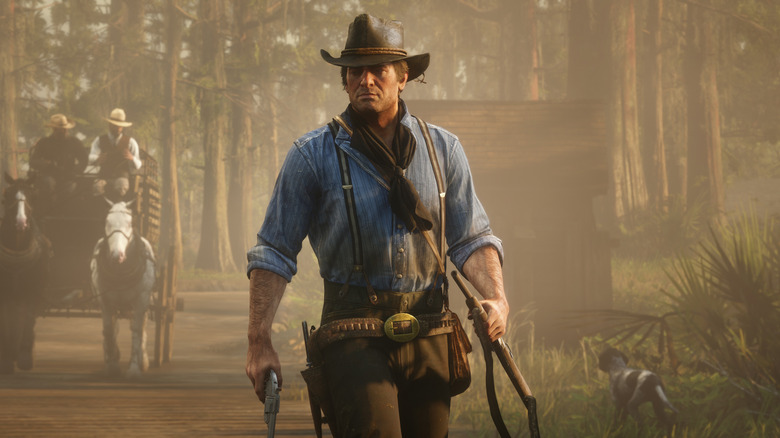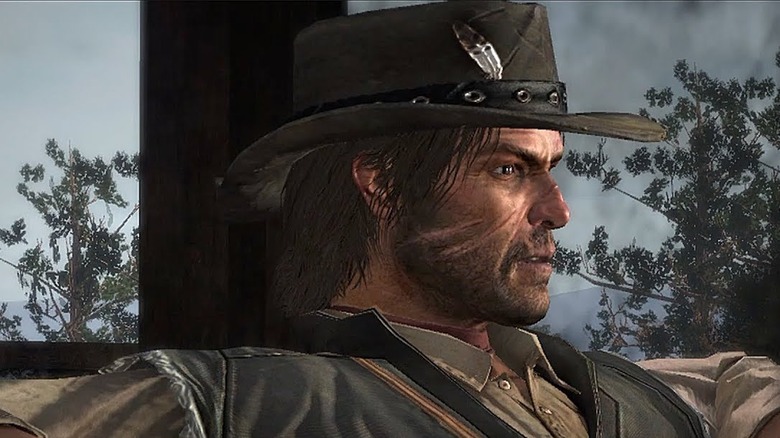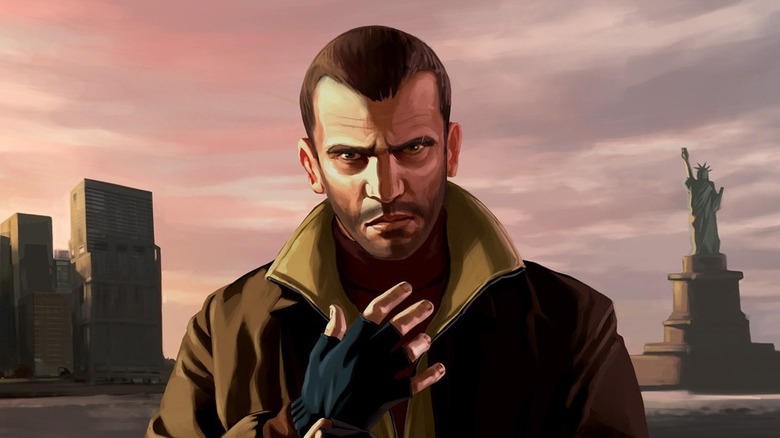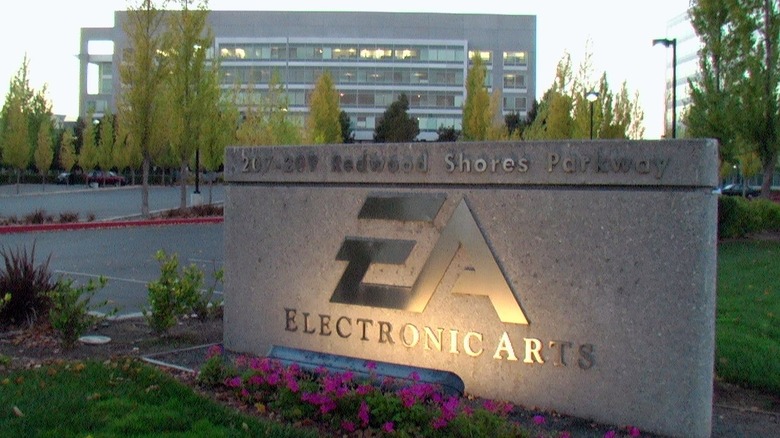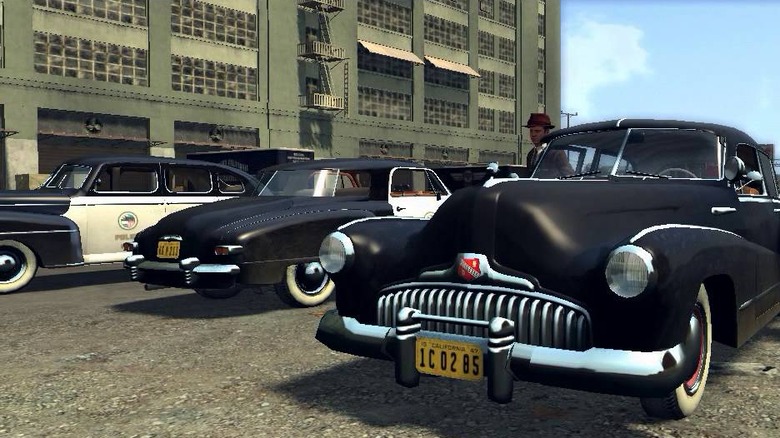The Untold Truth Of Rockstar Games
For publisher Rockstar Games, the past 20 years have been action-packed, much like the games that have made it a household name. Between high-profile and lengthy development cycles, sales numbers that put most video game companies to shame, and a seemingly endless supply of controversy, the acclaimed publisher has evolved into one of the game industry's juggernauts.
Once co-founders Sam and Dan Houser were brought over from original Grand Theft Auto developer DMA Design to form Rockstar as a subsidiary of Take-Two Interactive, it set in motion a series of events that would shake up the entire industry. These visionary brothers helped usher in a new era, one that brought forth genre-bending innovations and showed the world that video games weren't just for kids.
However, while even the most casual video game fans have an understanding of Rockstar's impact on the industry, there are still plenty of stories involving the company that are lesser known. Here are just a few of them.
The original GTA started as Race 'N' Chase
In an alternate reality, Rockstar Games' best-selling franchise would be known as Race 'N' Chase. Back in 1995, the precursor to Rockstar, DMA Design, created a pitch for a top-down, open-world game centered around cars, cops, and crime.
DMA wrote a design document that went into great detail about the vision for Race 'N' Chase. The game's story would take place across three cities –- New York, Venice, and Miami -– and each city would have its own unique art style. The pitch also included plans to produce the title for DOS, Windows 95, PlayStation, Sega Saturn, and Nintendo 64 (then known as "Ultra 64").
It was an ambitious an idea, but because the DMA Design team was largely made up of inexperienced developers, the game went through a multitude of development problems. After missing its original 1996 release window, the game was retooled and retitled as Grand Theft Auto. It released in 1997 for Microsoft Windows.
No such thing as bad publicity
Over the years, Rockstar Games has embraced the mindset that there's no such thing as bad press. If the company and its games are widely covered in the media, that's a success no matter what. This mindset started back with DMA Design and the original Grand Theft Auto. BMG Interactive -– DMA's one-time parent company -– hired acclaimed publicist Max Clifford to help present the game to the media.
Instead of simply letting journalists see and play the game for themselves, Clifford presented them with trumped up tales of the game's follies, which included running over innocent bystanders and mowing down cops. His belligerent words had both the British and American media so up in arms that they essentially waged war on the game, denouncing it as "sick" and beneath contempt." Clifford and GTA's creators got exactly what they wanted because of that coverage. The media couldn't stop talking about the game, and as a result, consumers couldn't stop buying it.
In the two decades since, the Houser brothers and Rockstar Games have continued to adopt Clifford's philosophy. Seemingly every Grand Theft Auto title has dealt with controversy, be it lawsuits, public outcry, or even the dreaded Adults Only rating. But, for the most part, the bad press has not detracted from the series' billions of dollars in earnings.
Rockstar's only movie tie-in resulted in a lawsuit
Rockstar Games has always been known for its original IPs, but on one singular occasion, the publisher put out a movie tie-in game. Back in 2005, developer Rockstar Toronto finished up The Warriors, a prequel to the 1979 movie of the same name. This 3D beat-em-up did extremely well, both critically and commercially. Some even regarded it as the best game adaptation of a film ever made. The game's success was likely due to the film's cult following coupled with Rockstar's smart decision to hire the original cast to reprise their roles.
Well, most of the original cast. After the game's release, Roger Hill –- who played the gang leader Cyrus, but didn't have any involvement in the game –- filed a quarter-million-dollar lawsuit against Rockstar and Take-Two Interactive for using his voice and likeness without explicit permission.
There are no exact details regarding the outcome of the lawsuit, but shortly after Hill filed, Take-Two responded by stating that it possessed a valid third-party license for usage of his likeness. Despite the legal trouble, The Warriors showed the industry that the powerful publisher could even put out a movie tie-in and make millions.
The Manhunt mutiny that almost was
Like many Rockstar titles, 2003's Manhunt turned out to be both a critical and commercial success, despite its controversial subject matter. Regarded as the company's most graphic and gruesome game, it actually drew the attention of Joe Baca, a US representative who sponsored a bill that would fine those who sold mature games to kids under 17.
Yet Manhunt never suffered because of government legislation or any subsequent media coverage. The problems stemmed from an internal struggle that came about during Rockstar North's development cycle. Outside of North, most Rockstar's employees were unhappy with the game's shockingly graphic nature. In fact, as former employee Jeff Williams revealed in a blog post, the survival horror game nearly caused a mutiny within the company.
"Manhunt, though, just made us feel all icky," wrote Williams. "It was all about the violence, and it was realistic violence. We all knew there was no way we could explain away that game. There was no way to rationalize it. We were crossing a line." While it's true that many in the company hated the game, the aforementioned mutiny never occurred. The game turned out to be yet another success for Rockstar and even spawned a 2007 sequel, though it hasn't continued since.
How "Hot Coffee" burned Rockstar
Those familiar with 2005's Grand Theft Auto: San Andreas are undoubtedly aware of the infamous "Hot Coffee" mod. A sexually explicit mini-game buried in the code, discovered through the use of third-party modification tools, led to widespread public outcry and an ESRB rating change from Mature to Adults Only. An AO was essentially the kiss of death, because major retailers such as Target, Walmart, and Best Buy refused to sell games with that rating.
Because Rockstar spent multiple weeks recalling copies of the San Andreas and simultaneously cleaning up the game to prepare for a Mature re-release, the company lost an estimated $50 million in sales revenue. However, that was minor compared to the myriad of lawsuits brought against Rockstar Games and Take-Two Interactive.
In 2006, the city of Los Angeles filed a lawsuit, stating that Take-Two failed to disclose the game's graphic, sexual content. Around the same time, many of the company's investors also filed lawsuits after the game's recall led to millions in losses and a severe stock dip. Yet, the most notable legal battle was the class action suit against the publisher, alleging that the company committed fraud. In 2009, almost four years after San Andreas' original release date, Take-Two settled that lawsuit to the tune of $20 million.
Rockstar's crunch time controversy
For a long time, crunch has been a terrible part of the video game development cycle. When a game nears its launch date, dev teams often put in long hours to ensure the title is up to par when it finally hits shelves. However, that was challenged in 2010, when the wives of multiple Rockstar San Diego team members penned a letter outlining the mandatory 12-hour workdays, low morale, and severe pressure developers dealt with during the late stages of Red Dead Redemption's production.
Since then, Rockstar Games has often faced scrutiny for its studios' work environments. This resurfaced in 2018, right before Red Dead Redemption 2's release, when Rockstar's Dan Houser mentioned to New York Magazine that his team worked several 100-hour weeks throughout the game's development. Not long after that statement, an in-depth Kotaku expose detailed the company's working conditions. Many employees mentioned Rockstar's philosophy, which equated working hard with working for as many hours a day as possible. Others discussed the immense pressure they felt to work nights and weekends in order to succeed. As Kotaku's Jason Schreier wrote, many employees used the phrase "culture of fear" when describing the in-office dynamic.
While Red Dead Redemption 2 released in October 2018 without issue and generated massive sales numbers, the controversy surrounding employee treatment during crunch periods isn't something the media or gaming public will soon forget.
Out of retirement and into the Old West
Actor Robert Wiethoff got his big break with Red Dead Redemption. Cast as protagonist John Marston, Wiethoff portrayed the gruff anti-hero phenomenally and received critical acclaim for the performance. He even garnered multiple nominations for his acting, including a Spike Video Game Award. However, not long after the game's release, Wiethoff decided that he no longer wanted to deal with the tough world of acting. He left Los Angeles and moved back to his hometown of Seymour, Indiana, where he took a 9-to-5 gig at an industrial supplies company.
Well, those who have played Red Dead Redemption 2 likely know where this story goes. Rockstar was able to convince Wiethoff to come back to acting and once again portray John Marston — albeit a slightly younger version — in the sequel/prequel. He knocked the role out of the park (again) and helped tell the story that led up to Marston's capture in 1911.
Grand Theft Auto 4 was nearly a PS3 exclusive
If not for an extremely intelligent business decision by Microsoft, Xbox 360 owners may never have enjoyed the murder and mayhem of Grand Theft Auto 4. There was a time, during Rockstar North's development of the game, when it was a planned PlayStation 3 exclusive.
It wasn't until Microsoft agreed to shell out $75 million that Rockstar Games offered up the adventures of Niko Bellic for the Xbox 360. First reported by industry analyst Michael Pachter, Microsoft's agreement insured that the GTA franchise would have a home on Xbox consoles for years to come. In fact, when Rockstar announced at E3 2006 that GTA 4 would hit not only PS3 but also Xbox 360, the positive response was palpable.
The expensive deal turned out to be lucrative for both parties. Not only was GTA 4 slated to release on 360 in 2008, but Grand Theft Auto 3, Vice City, and San Andreas all came to the original Xbox and PC mere months after that exciting E3 announcement. When 4 was finally released, it sold over 3.6 million copies in the first 24 hours.
EA nearly had its own Rockstar
Rockstar Games has had a wild ride in the games industry. That ride nearly went off the rails in the winter of 2008, when Electronic Arts placed a $2 billion bid to acquire Rockstar's parent company Take-Two Interactive. Regarded as a direct response to publisher Vivendi's recent merger with Activision, an EA acquisition of Take-Two would have solidified the publisher's place at the top of the video game industry.
After taking the bid public in February of 2008, Take-Two chairman Strauss Zelnick responded, stating the the offer undervalued the company and didn't factor in just how impactful the Grand Theft Auto series had become. While Electronic Arts maintained that the acquisition would be in Take-Two's best interest, even taking the bid directly to its shareholders, the company refused the $2 billion offer.
After much deliberation — some public and much private — EA abandoned its bid in August of 2008. Take-Two Interactive has continued to operate independently to this day.
Jay Leno's Garage helped out with LA Noire
When Rockstar Games signed on to publish and co-develop Team Bondi's 1940s-era detective title LA Noire, there was no doubt that the industry powerhouse would have a positive influence on the game. While Rockstar helped bring in new facial capture technology, strong story beats, and a brilliantly detailed version of Los Angeles, many gamers may not know that the company's influence also led to the involvement of Jay Leno, one of the kings of late night TV.
As a noted vintage car collector, Leno has a garage filled with motor vehicles from the 1930s and '40s, which were exactly what LA Noire's dev team needed. During development, Leno allowed the crew to access his famous garage in order to take pictures of some of his most hard-to-find automobiles, including a contemporary fire engine.
After the game's release, many critics and consumers praised it for its attention to detail and authentic look, especially its cars. Thanks, Jay.

